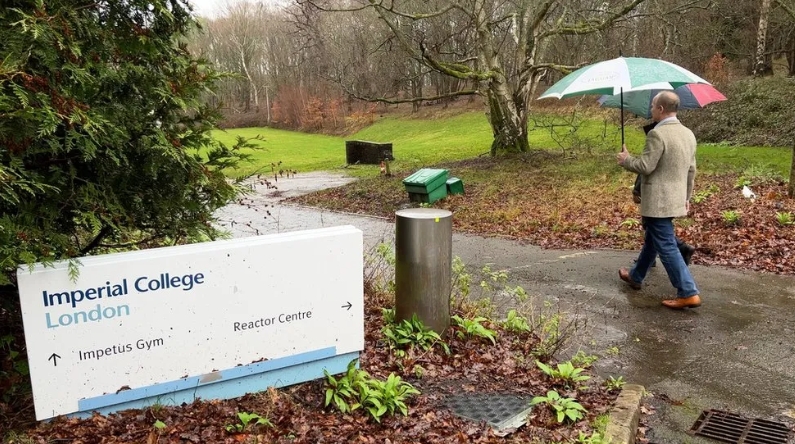
Beside an arrow pointing to a campus gym, another points to the Imperial College Reactor Centre in Ascot.
While the sports building is clearly visible, all that stands in front of it now is an open field.
But for almost half a century, the patch of grass - not far from Ascot's world-famous racecourse and Legoland - was home to a nuclear reactor.
It played a vital role in supporting the training of nuclear scientists who would help design Britain's first generation of power-generating reactors.
Now, after 10 years' work, it has become the first civil nuclear site in Britain to be fully decommissioned - the point where regulators have been able to revoke its licence and end the strict controls imposed to protect the public.
"There's no trace of any contamination or radioactivity on the site," said Ross Manson, Imperial College's radiation protection manager.
Readings taken on site show nothing more than background levels of radioactivity, meaning it has been returned to its original state before the reactor was built and "went critical" in 1965.
"It can be used as a playing field by staff and students, entirely oblivious to its past nuclear history," said Mr Manson.
In fact, except the sign, all that remains is the reactor's control desk, now on display in a nearby building on the campus.
With its mass of warning lights, dials and switches, it has been compared to the original console on Doctor Who's Tardis. Both were designed at about the same time but while the Tardis changed down the years, the reactor console did not.
"It operated perfectly successfully, perfectly safely, throughout its life and, indeed, although the technology is old, it's reliable," said Trevor Chambers, the former head of the reactor centre who also oversaw its decommissioning.
In fact, the entire site changed little - other than the addition of some extra research buildings - until after the 9/11 terror attack in the US.
Concerns that nuclear sites could be potential targets saw it being protected by what Mr Chambers describes as a "Jurassic Park"-style security fence, truck-proof concrete bollards and security bars on the windows.
It was the waning popularity of nuclear power in Britain that finally put paid to the site a little over a decade later.
"It was one of the facilities that were built in the early 1960s to support the expanding UK nuclear programme," said Mr Chambers.
"It could plug straight into a university campus for research to support all of the new reactor designs, which the UK were producing themselves."
The site itself never generated any electricity and was relatively small. Material could be inserted into the reactor core and then tested in an adjacent laboratory.
Like in much of the world, by the start of the new century the view in Britain of nuclear as a reliable source of clean energy had changed following events like Three Mile Island in the US and Chernobyl, in what was then the Soviet Union.
"By 2012, the industry in this country was contracting; we certainly hadn't built any new reactors in this country since the 1980s," said Mr Chambers.
With demand on the site falling, the decision was taken to shut the reactor down and decommission the site.
That presented its own problems. Because of its small scale, the reactor had never had to be refuelled, so the first task was to design a system to remove the fuel remotely. A bespoke flask was also needed to transport the radioactive material from the site, under the Heathrow flightpath.
The work even had to take account of a badger sett alongside the reactor and research buildings.
But now, the UK is looking again towards nuclear as a source of electricity as it tries to decarbonise power generation. One site is under construction at Hinkley Point in Somerset and another is proposed for Sizewell in Suffolk.
Students wanting to perform research, such as that carried out in Ascot, now have to travel to sites in France and Australia.
Imperial College is one of a number of universities still running nuclear postgraduate courses.
"One of the things that the nuclear industry is trying very hard to do is to actually increase the numbers of students, at all levels," said Mr Chambers.
"Simply because we will need a lot of professional young people coming into the industry, fully trained, in order to operate the new reactors when they're online, which is not so very far away."